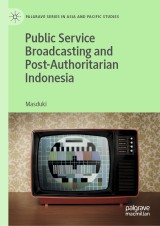Details

Public Service Broadcasting and Post-Authoritarian Indonesia
Palgrave Series in Asia and Pacific Studies
|
96,29 € |
|
| Verlag: | Palgrave Macmillan |
| Format: | |
| Veröffentl.: | 22.10.2020 |
| ISBN/EAN: | 9789811576508 |
| Sprache: | englisch |
Dieses eBook enthält ein Wasserzeichen.
Beschreibungen
This book investigates public service broadcasting (PSB) models in post-authoritarian regimes, and offers a critical inspection of the development of a Western European-originated PSB system in Asian transitional societies, in particular in Indonesia since the 1990's. Placing the case of Indonesia's PSB within the context of global media liberalization, this book traces the development of public service broadcasting in post-authoritarian societies, including the arrival of neoliberal policy and the growth of media oligarchs that favour free market media systems over public interest media systems. The book argues that Western European PSB models or 'BBC-like' models have travelled to new democracies, and that autocratic legacies embedded in former state-owned radio and television broadcasters have resisted pro-democratic media pressures. As such, similar to new PSBs in other post-colonial, transitional and global south regimes, such as in Arab states or Bangladesh, this book demonstrates that the adoption of PSB in Indonesia has not reflected the ideal PSB project initially envisaged by media advocates but was flawed in both media policy and governance. It explores the history of broadcast governance in authoritarian Indonesia, and considers how Western European PSB or 'British Broadcasting Corporation/BBC-like' models have travelled – somewhat uneasily – to new democracies, but also how autocratic legacies embedded in former state-owned radio and television channels have resisted external parties of pro-democratic media systems. <p></p>
Introduction and Methodology.- Public Service Broadcasting: Politics, Policy, Models.- Indonesia as a Case Study.- Broadcasting Systems in Authoritarian Indonesia (1933-1998).- Reforming Indonesian Broadcasting System (1998-2002).- Indonesian PSB in Practice: Market Driven Politics, Clientelism, and Paternalism (2002-2017).- Indonesian PSB Model: Continuity and Change.
<p><b>Masduki</b> is a lecturer at the Department of Communications, Universitas Islam Indonesia, Yogyakarta, Indonesia. He earned his doctoral degree at the Institute of Communication Studies and Media Research (IfKW), University of Munich, Germany (2019). He is a veteran radio journalist and served as the program director of Radio Republik Indonesia (RRI), Jakarta's headquarters, between 2010 and 2012. He is also a founder of <i>Rumah Perubahan Lembaga Penyiaran Publik</i>, an NGO for public media advocacy in Indonesia. He has published several books on the Indonesian media system and his articles have appeared in such scholarly journals as <i>GAZETTE</i>, <i>Journalism Studies</i>, <i>Journal of Digital Media Policy</i> and <i>Media Asia</i>. Masduki has a particular interest in media policy, comparative media systems, and journalism.<br></p>
This book investigates public service broadcasting (PSB) models in post-authoritarian regimes, and offers a critical inspection of the development of a Western European-originated PSB system in Asian transitional societies, in particular in Indonesia since the 1990's. Placing the case of Indonesia's PSB within the context of global media liberalization, this book traces the development of public service broadcasting in post-authoritarian societies, including the arrival of neoliberal policy and the growth of media oligarchs that favour free market media systems over public interest media systems. The book argues that Western European PSB models or 'BBC-like' models have travelled to new democracies, and that autocratic legacies embedded in former state-owned radio and television broadcasters have resisted pro-democratic media pressures. As such, similar to new PSBs in other post-colonial, transitional and global south regimes, such as in Arab states or Bangladesh, this book demonstrates that the adoption of PSB in Indonesia has not reflected the ideal PSB project initially envisaged by media advocates but was flawed in both media policy and governance. It explores the history of broadcast governance in authoritarian Indonesia, and considers how Western European PSB or 'British Broadcasting Corporation/BBC-like' models have travelled – somewhat uneasily – to new democracies, but also how autocratic legacies embedded in former state-owned radio and television channels have resisted external parties of pro-democratic media systems. <p></p>
Investigates public service broadcasting (PSB) models in post-authoritarian regimes Examines a case of PSB policy and governance outside Western Europe and North America Considers an alternative picture of post-war, post-communist, and post-authoritarian societies that introduce PSB to accompany the introduction of democracy
Diese Produkte könnten Sie auch interessieren:

Communicating Science in Social Contexts

von: Donghong Cheng, Michel Claessens, Nicholas R. J. Gascoigne, Jenni Metcalfe, Bernard Schiele, Shunke Shi

149,79 €















